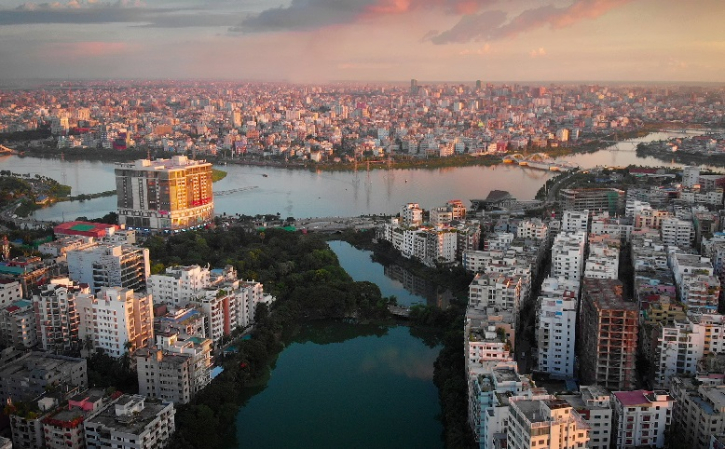
Photo: Collected
A vulture's vision is often associated with short-term gains and a lack of consideration for the broader implications of political actions. Politicians and political parties should focus on sustainable and inclusive policies that benefit the entire population, rather than short-sighted maneuvers that may yield immediate rewards but harm the nation's future.
Bangladeshi politics, like any other political landscape, is a complex arena where the visions and actions of its participants shape the destiny of the nation. In recent times, the metaphorical "vulture's vision" has been used to caution against certain detrimental practices within the political sphere. This metaphor, evoking the image of a vulture circling for prey, implies a shortsighted, opportunistic approach that prioritizes personal gain over the well-being of the nation.
One aspect of avoiding a vulture's vision in Bangladeshi politics involves steering clear of divisive and destructive tactics. Vultures, in the natural world, are opportunistic scavengers that thrive on the misfortune of others. Similarly, in politics, adopting strategies that exploit societal divisions or capitalize on crises for personal or party gain can have long-lasting negative repercussions for the nation.
Transparency and accountability are crucial in avoiding the pitfalls of a vulture's vision. A healthy political system demands openness, where leaders are accountable for their decisions and actions. This transparency builds trust among citizens and prevents the manipulation of political processes for personal or factional interests.
Furthermore, responsible governance is integral to steering clear of a vulture's vision. Policies and decisions should be made with the long-term well-being of the nation in mind. This requires a commitment to development, social justice, and environmental sustainability. A myopic focus on immediate gains can jeopardize the country's stability and hinder its progress on the global stage.
Avoiding a vulture's vision also entails fostering a political culture that values collaboration over confrontation.
Constructive dialogue and cooperation between different political parties contribute to a healthier democracy. Political leaders should prioritize the greater good, rising above personal animosities and working together to address the challenges facing the nation.
The increased diplomatic activity of the US, China, and India in Bangladesh could be influenced by strategic interests, economic opportunities, and regional stability. Bangladesh's geopolitical significance, economic growth, and potential as a regional player might contribute to its importance on the global stage. The future position of Bangladesh in world politics will depend on its diplomatic decisions, economic development, and regional collaborations.
The influence on Bangladesh's politics post-independence, whether from Indo-Russian forces or the West during the military regime after the 1975 assassination of the nation's father, has diminished. Presently, Bangladesh possesses the capability to establish a robust position, safeguarding its interests.
The trajectory of future world politics signals a shift towards the Indo-Pacific region in the 21st century's first decade. This shift is propelled by several factors, including China's ascendance in global politics and economy, the geopolitical and geostrategic significance of Southeast Asia, the emergence of these regional countries as economic powers, and the ability of states within ASEAN to foster regional cooperation and balance. Additionally, the Indo-Pacific region's natural resources and trade routes contribute to its growing importance.
Undoubtedly, the relevance of the Bay of Bengal amplifies with the increasing significance of the Indo-Pacific, solidifying its position as a vital player in the evolving dynamics of global politics. The geopolitical importance of Bangladesh has grown significantly in recent years, driven by its strategic location, economic potential, and regional influence. As a key player in South Asia, Bangladesh's stability and development are crucial for maintaining regional harmony.
The government plays a vital role in shaping Bangladesh's geopolitical standing through diplomatic initiatives, economic policies, and regional collaborations. It is essential for the government to strike a balance between aligning with global powers and safeguarding national interests. Effective diplomacy and strategic partnerships can amplify Bangladesh's voice on the world stage.
Opposition parties also hold a responsibility in contributing constructively to the country's geopolitical narrative. A united front on crucial international matters strengthens Bangladesh's position and enhances its credibility in global forums.
However, political divisions should not compromise the nation's standing or hinder its ability to navigate complex international relations.
Several factors contribute to the rising importance:
1. The Bay of Bengal plays a crucial role in maintaining connectivity with South and Southeast Asia.
2. China's interest in the Bay of Bengal is aimed at strengthening its position vis-a-vis the US and its allies in the Straits of Malacca, a vital trade route for China.
3. China's exploration of alternatives in the Bay of Bengal prompts the US to reconsider its containment policies.
4. The Bay of Bengal serves as a link between the Indian Ocean and the Pacific Ocean.
5. Despite Bangladesh lacking a direct border with China, its proximity raises concerns for China about the US presence in the region.
6. India's recent foreign policy decisions, especially regarding the Ukraine war, have caught the attention of the US administration, increasing Bangladesh's importance in managing regional dynamics.
7. India's interest in the region, particularly for trade with the Seven Sisters kingdom, adds another layer of complexity.
8. Bangladesh's involvement in China's Belt and Road Initiative and its strategic location between South and East Asia positioned it to influence the politics, economy, and trade of the vast South and Southeast Asian economic market—comprising about 3 billion people.
Bangladesh emerges as a focal point for powerful nations globally, including Europe and America, as they strategically focus on the nation due to its crucial role in shaping the geopolitical landscape of the region. In recent times national and international reasons have shaped our position. Now the independent position of Bangladesh has been created with the superpowers. Geographical location, development and national capacity building have played an important role in this regard.
China has invested about $7.5 billion in the Kyokufu Port and Economic Zone in Rakhine State on the Bay of Bengal. From there, 771 kilometers away, it has a pipeline to Kunming, China, through which oil and gas from the Middle East will go to China through the Bay of Bengal. The Bay of Bengal will be used as a hub.
Therefore, this region has become an area of geopolitical and geostrategic significance for China. China will remain very cautious and firm on the affairs of the region. US policy, on the other hand, is world politics as always, revolving around them when they are peers or rivals. Therefore, their foreign policy in the future will be around China. In that context, China's neighboring countries will be the first target of US policy.
Although the objectives of both China and the United States are different, the goal is the same, that is to save their interests. Both states are important to Bangladesh. Especially China in terms of imports, US and its allies Europe in terms of exports.
As such, Bangladesh should step forward. National capacity should be increased by applying pilot fee behavior to achieve self-interest. At the same time, import and export should be multi-dimensional. Relations with other countries through bilateral or multilateral should be increased and new markets should be sought. Dependence on the West and China should be reduced. Otherwise, there is a high possibility of getting into deep trouble in the near future. Along with that, efficient and prudent policy makers have to play an important role. Policy has to be formulated to balance strategy and national interest. Otherwise, the conflict of interests of the superpowers will have to be watered down and the national interest and sovereignty will be threatened.
Bangladesh's geopolitical importance in world politics hinges on the government's diplomatic acumen, economic policies, and collaborative efforts, while a unified approach from opposition parties can further elevate the country's influence on the global stage. Avoiding a vulture's vision in Bangladeshi politics is imperative for the nation's progress and stability. Political leaders and parties must prioritize long-term goals, embrace transparency and accountability, and foster a culture of collaboration. By doing so, Bangladesh can navigate the complexities of its political landscape with foresight and resilience, ensuring a brighter and more sustainable future for its citizens.
Author : Lawyer, Critic,and Social Worker

.png)







